Devilman Crybaby joined the Netflix roster last week, and it’s one hell of an anime. A reimagining of the 1970s manga, it’s a bloody story of love and loss. Staff writer Heather Alexandra and video producer Chris Person sat down to talk about why they love their precious demon boys.

Heather Alexandra: Chris! Both of us have watched Devilman Crybaby, an anime series directed by Masaaki Yuasa based on a pretty well-known manga from the 1970s written by Go Nagai. It starts off a bit quirky before devolving into a tale of violence, sex, demons, and biblical conflict. I’ll be honest with you, I had no clue what I was getting into and I found it both completely overwhelming and strangely beautiful.
You went into Crybaby knowing a lot more about Yuasa’s work and Devilman as a whole. What did you think of the series? Did it live up to expectations?
Chris Person: Oh hell yeah it did. To be honest I kind of didn’t know what to expect on some level, just because Devilman has traditionally been such a violent and horny property and Masaaki Yuasa seems like a gentle dude, but the combination totally works for me. Although it makes sense given his work on Kemonozume.
Alexandra: I don’t watch as much anime as you do and I mostly know Yuasa from animation he did on Samurai Champloo. His style’s pretty distinct and has a lot of bright colours and shifting bodies that works well with Devilman‘s core concept.
For people who don’t know, Devilman follows a Japanese student called Akira Fudo and his friend Ryo Asuka. Ryo has been studying the existence of demons and wants to reveal them to the world. When demons have a bloody rampage at a drug-fuelled sex party, Akira manages to merge with one of them to become a Devilman, someone with the heart of a human but the body of a demon. It’s pretty rad stuff. I want to talk about Akira and Ryo before the demon-y stuff. I was hooked on their relationship from the start.
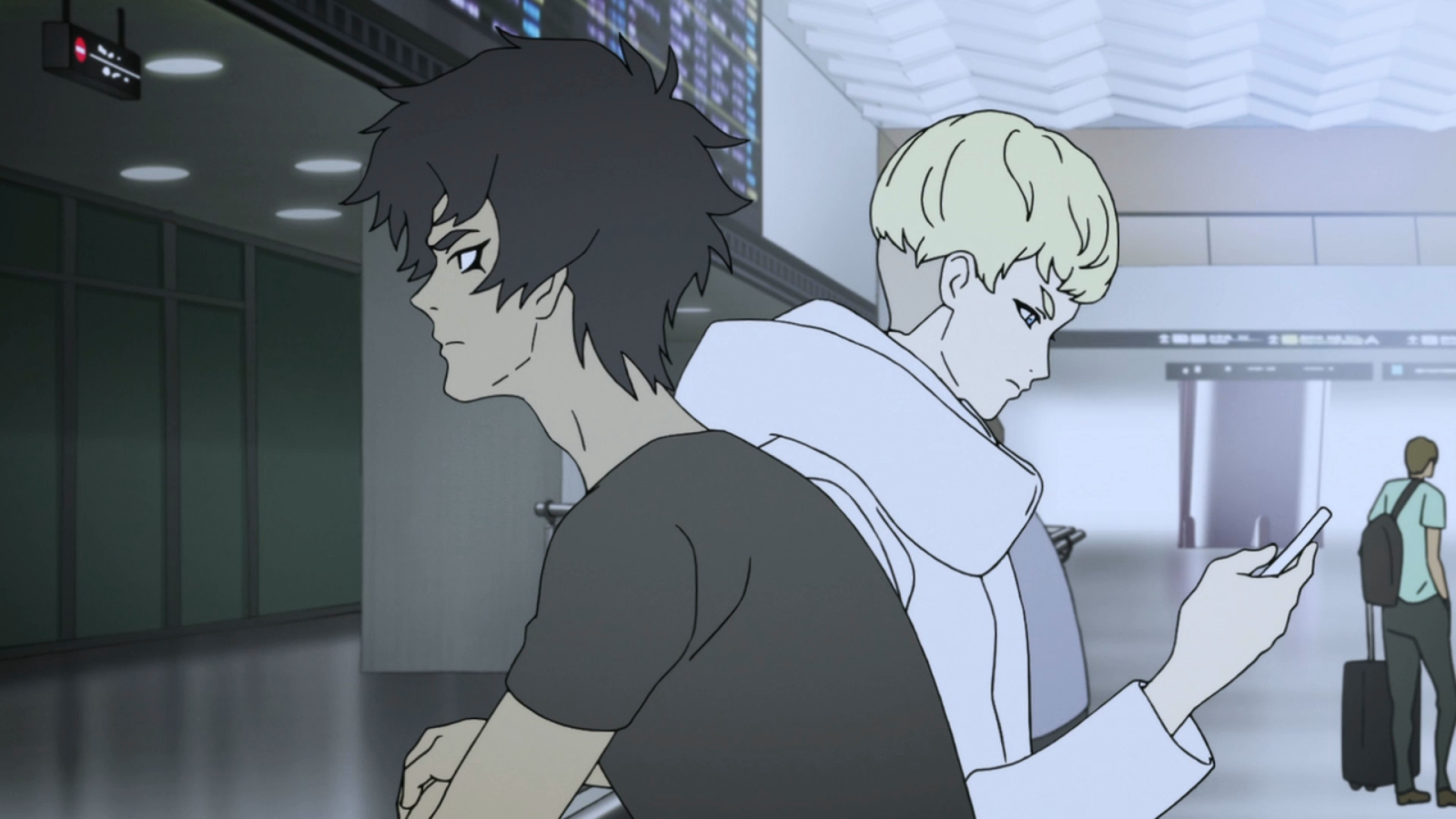
Person: I love my beautiful pure boys that worship evil. Like, right from the get-go when Ryo drives up with a machine gun and a Maison Margiela coat and tells him to drop what he’s doing so they can go drive around and catch up and put the devil inside him, that shit rocks.
Alexandra: There’s a genuine tenderness between the two that’s really easy to get behind. Ryo’s not the most compassionate person, but he has charisma. When he fires his machine gun at the kids on the pier, it has this exaggerated FLCL feel to it. When the series started, I thought it might be this quirky story about two dudes having strange adventures with demons, but that changes and turns dark pretty quick by the end of the first episode. Ryo starts stabbing people with a broken bottle at some wild orgy and it’s just the most extreme thing. I was shocked.
Person: Yeah it’s pretty shocking. I knew that part was coming because I rented the 2-Part OVA adaptation from Blockbuster Video when I was like 10 (Devilman: The Birth and Devilman: The Demon Bird). Sidenote: Don’t let a kid watch Devilman, unless they’re really, really mature and cool like I was.
Alexandra: It’s hard for me to know what to make of Crybaby‘s use of violence and sex. The animation creates this mesmerising spectacle of bodies and blood, and the writing is really focused on how vile and indulgent humans can be. At the same time, I found it occasionally distracting. The camera frames almost every woman it encounters in the most lustful way possible, and there’s so much violence that it loses impact after your third or fourth demon rampage. Did it work for you?
Person: I may be biased, but the way that Yuasa treats sex, bodies and violence really works for me. The entire narrative thrust of the first part is that sex is ludicrous and absurd, and that puberty is doubly so. Horniness is deeply silly. There’s also really empathetic depictions of what it’s like to not know what to do with yourself from both genders, and it’s one of the few shows that has both an explicit and metaphorical queer presence. It’s definitely A Lot but Devilman invented Being A Lot.
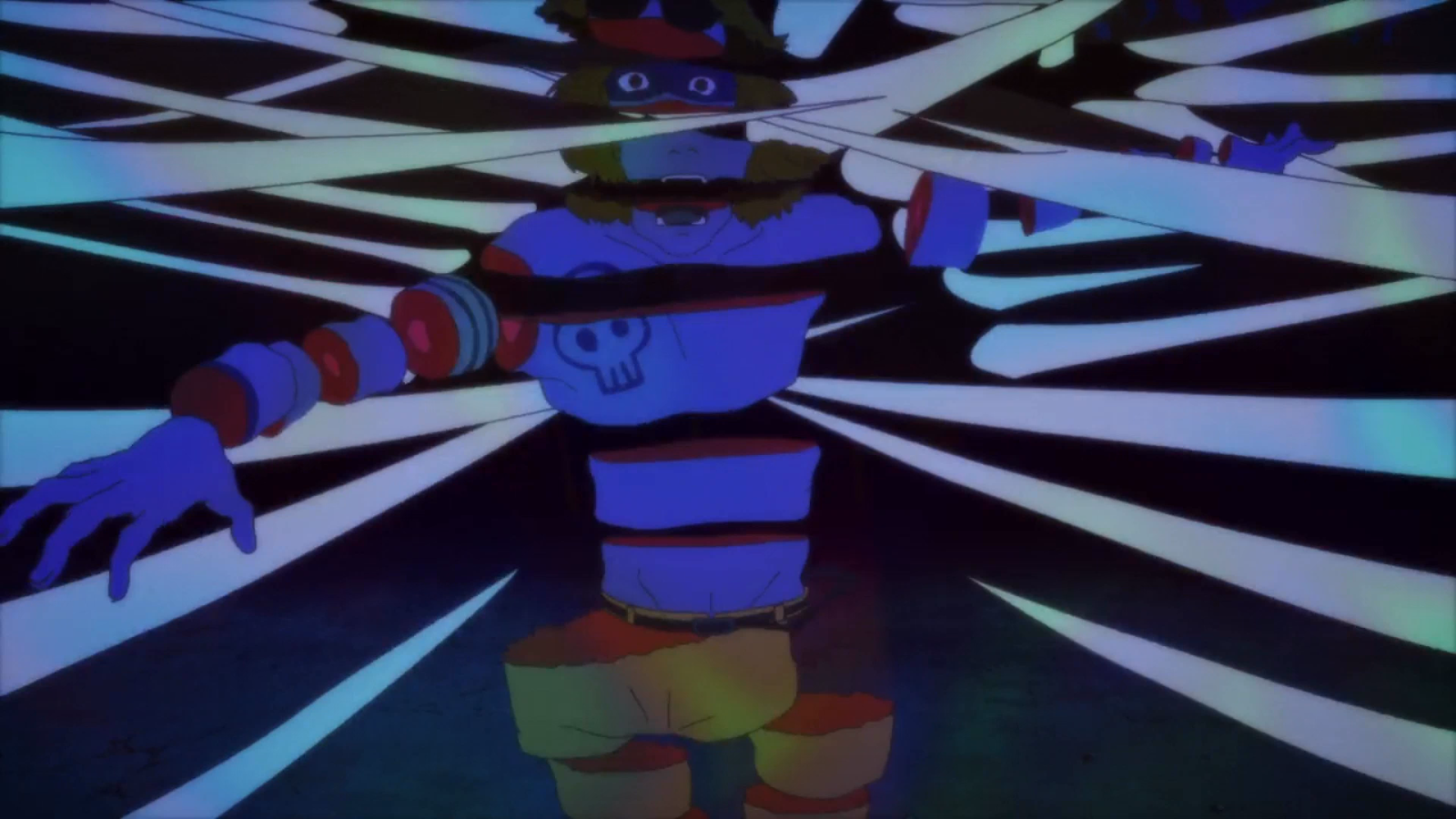
Alexandra: I struggled with it. Which isn’t to say it’s bad, y’know? I think a lot of it is really well done. There’s a lot of artistry going on here that’s meant to connect to large themes. We see demons having sex and tearing people apart at the start of the series, but by the end of everything humans are doing the exact same stuff.
In some cases, they do things more vile than the demons ever do. I think the reason it lost me a bit is that because it starts so extreme, each scene felt like it was trying to outdo what came before. It started to get a bit predictable.
But yes, let’s talk about the queer stuff for a minute because I think that’s just as important as the violence.
Person: Moreso, probably! (Not to diminish the importance of demonic dentata murders.)
Alexandra: It’s really easy to focus on the demonic stuff for sure. The series asks a lot of philosophical questions about what makes someone good and how easily someone can veer into debauchery. What makes someone human? What is justice?
But the concept of devilmen and the larger panic that happens later in the series once people start turning into demons is entirely about homophobia, transphobia, racism and what it means to see people as the “other.”
Person: It’s completely a metaphor for bigotry: the presence of queer couples in the club and the one pretty explicit gay sex scene we see later kind of cements that, paying off eventually in the big social media scene where you see someone say “I told my wife that I’m a devilman” followed by some pretty brutal online hate speech and doxing.
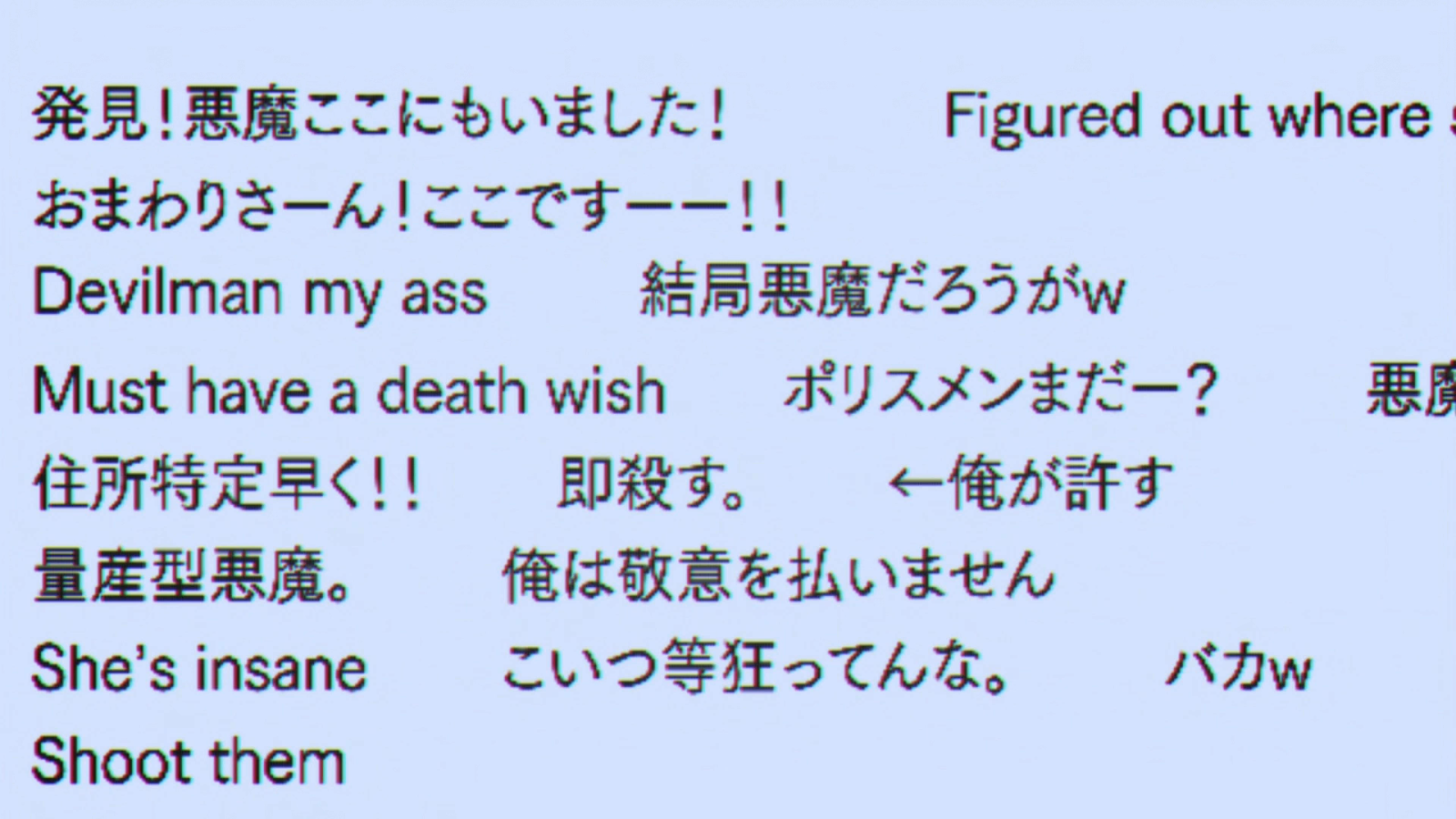
Alexandra: That was the moment that worked the most for me. I’m always a bit wary of using demons, magic, or fantasy creatures as allegory for minorities, but I think Crybaby makes up for some of that by making some of that subtext into text.
Miko admits that she loved Miki and Miki loves her right back even though she also loves Akira. Koda was in a gay relationship with his running partner. It’s not necessarily at the forefront of everything, but it’s there and visible and transgressive in a way I appreciate. To say nothing of Akira and Ryo.
Person: I was gonna say, those boys are in love.
Alexandra: The entire series hinges on their relationship. Crybaby‘s leading up to one moment: Ryo crying over Akira’s corpse as the world ends. Akira’s the only person that Ryo has any connection with. Even after we learn that Ryo is actually Satan, he never stops caring for Akira.
Person: It’s actually rendered really beautifully in the manga, and you can definitely see how that scene impacted, say, End of Evangelion.
Alexandra: Two people, broken after the end of all things, sitting on the shore of a red sea.
Person: The entire series begins with Ryo saying that love doesn’t exist and because love doesn’t exist his actions are justified, only to realise that he’s killed the only person he loves. The whole thrust of their relationship is Akira feeling twice as hard on his behalf to show him that the unselfish love of others is what makes life worth living.
People keep asking “why has Amon become trapped by such a scrawny human?” and it’s because his love and compassion for others is so pure and heartfelt.
Alexandra: You know, I just gotta say that even with all the demons I was not ready for how biblical this became. God is real! Satan is real!
Person: Satanic in an anime way. In the same sense that Evangelion is very Kabbalah-heavy.
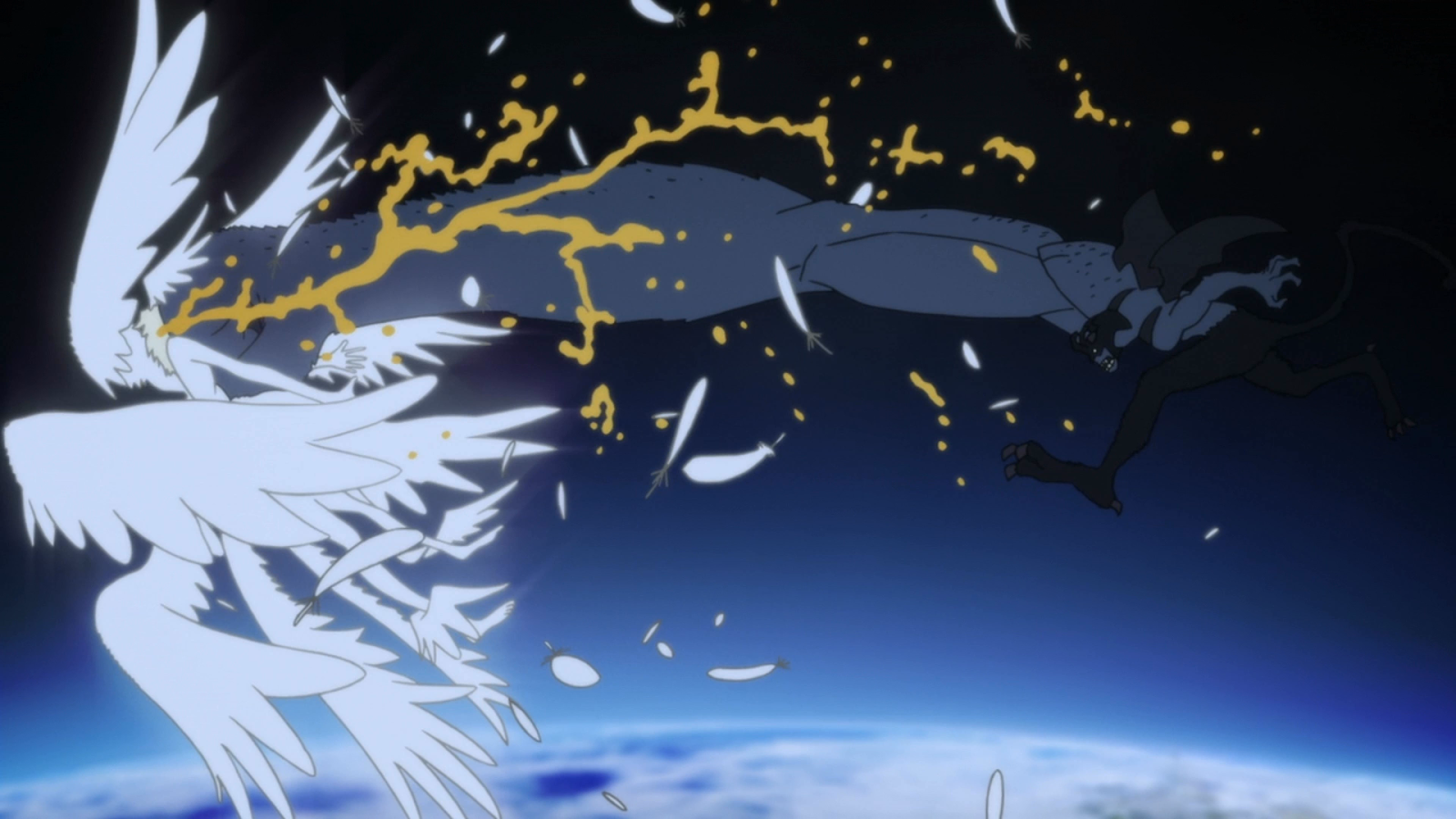
Alexandra: It’s got a Gnostic tilt as well. But it really did get into straight up End Times. A lot of that focused on the Makimura family and man, they just have it rough in the worst way. And yet, even with Ryo and Akira’s relationship, my mind’s mostly focused on Miki and especially her father.
Person: God, they make you feel that don’t they? It is super jarring how, as a friend of mine put it, time in the series seems to accelerate rapidly. Like the first half covers a few weeks and the second half is…years? I feel like Yuasa might be limited by the fact that he was adapting the manga, but it’s really surprising.
Also, can we talk about the very long, phonetically spoken English scenes with Ryo?
Alexandra: Totally. That happens a few times and I think it mostly worked for me.
Person: I’m kinda not mad. Dude’s just doing the best he can.
Alexandra: Yeah, I was able to roll with it. It’s a bit of an outlier because I think the voice cast does a pretty great job. I spent some time with the English dub as well and I was surprised how much I enjoyed it. Kyle McCarley, who voiced 9S in Nier: Automata, did a really good job as Ryo.
Person: Oh, that’s a really good casting choice.
Alexandra: Yeah, I think the production quality was solid across the board. Even only knowing Yuasa’s work a little bit, I expected great animation and got that. But the voice work and the music is killer as well.
It might have been real easy to go overboard but for a series about demons and the end of the world, everything comes together nicely. There’s this scene near the end where Miki is running while this piano melody plays underneath and it’s astounding. Really tragic and affecting.
Person: Oh god, yeah. The way Yuasa animates running in general is really fantastic including the “chad run” that devilmen do.
Alexandra: Also: the rapping!
Person: That scene’s great! The rapping reminded me of the Sion Sono movie Tokyo Tribe, if you’ve ever heard of it.
Alexandra: That’s a change from the original, right?
Person: Yeah, rapping was not much of a thing in Japan in 1972. I believe they’re just kinda stereotypical Japanese tough guys in the original.
Alexandra: There’s a lot of small changes that really help. The political aspects hit a little harder too. America closing borders and casting suspicion on Russia once demons are exposed, a juxtaposition between nukes and God’s wrath. Little tweaks that keep it in the zeitgeist.
Person: I’m like 60 per cent sure Trump is in there for a shot.
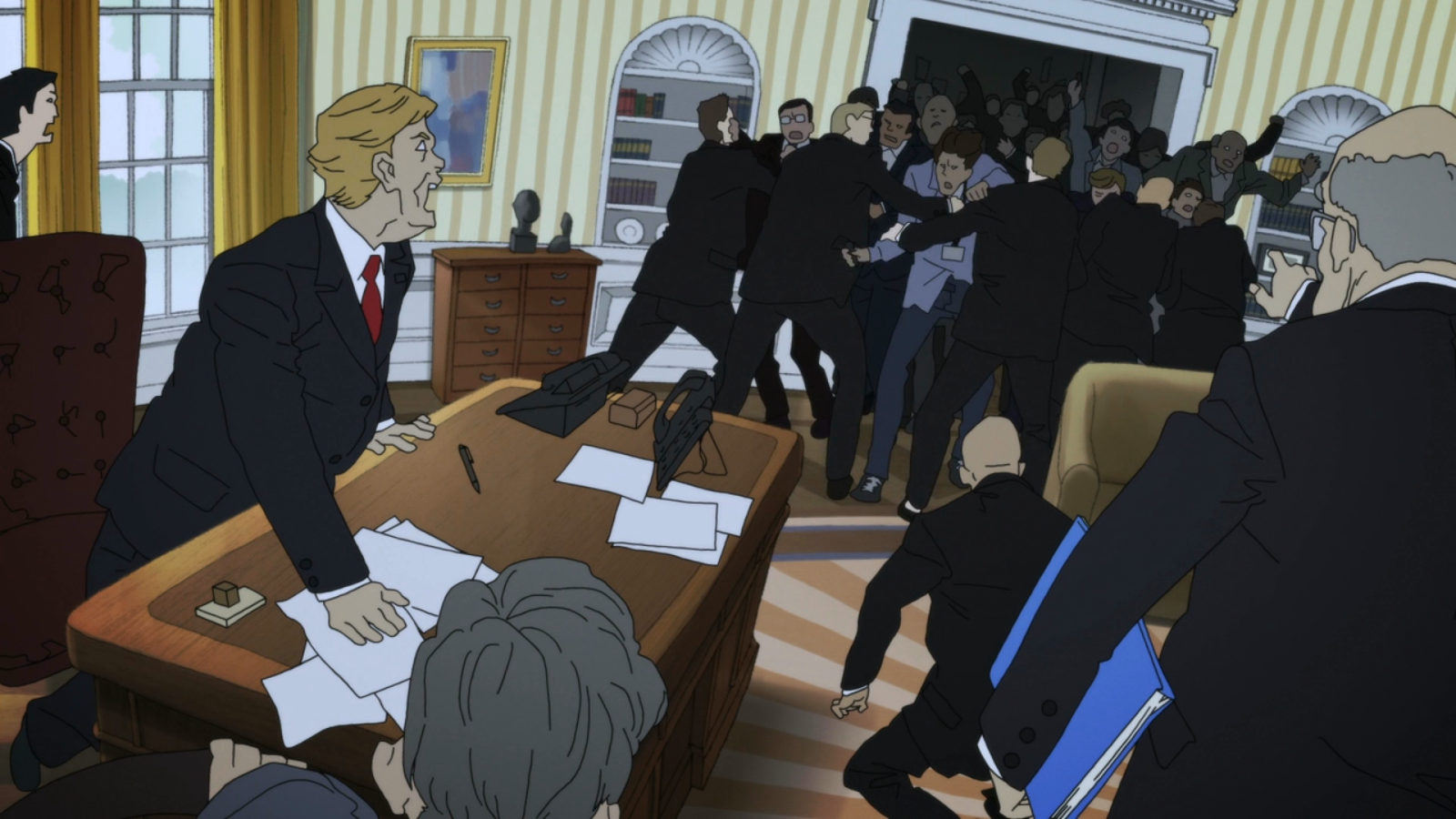
Alexandra: He is! There’s anime Trump and he looks like a complete jagoff. As he should.
There’s something to be said for how nihilistic everything is as well. I gather that’s something from the manga but they give us a lot of hope near the end. Miki’s internet post about embracing devils, the humans who decide to stop throwing stones at Akira, and this big final battle that feels super triumphant. And then… it’s not. Maybe it’s a little bleak but I feel that, y’know?
Person: I really don’t like characterising Devilman Crybaby as nihilistic because it has an emotional core and a thesis that it strongly believes in. Like, yeah it’s a tragedy but it has deeply felt convictions.
Alexandra: That’s fair. There’s meaning in the struggle even if things don’t end well.
Person: And canonically speaking I don’t think it’s the end of the world. God’s been through this song and dance before.
Alexandra: Someone told me that and it’s heartbreaking. Everything that happens is part of a big eternal cycle where Satan is punished and loses the only person he loves over and over again. Like, damn.
Person: Maybe next time love will win.
Alexandra: I’d like that. I really enjoyed Crybaby. I think it worked best for me more in the smaller moments. Akira trying to get Ryo to swim in his pool, Miki’s father breaking down as he tries to shoot his demon son, that street rapper moving Miko to tears with his song. I like the big, bloody stuff, but those are the things that I can’t get out of my head.
Person: I love it. I think it’s a great jumping off point for people into Yuasa’s other work and I hope Netflix keeps giving him barrels of money until they can no longer afford to. If you like it, watch his other stuff!
Ping Pong and Tatami Galaxy are great! Kaiba (arguably his best work) is getting a bluray release over here and he put out two features last year that are getting some US distribution, finally. Devilman is messy and violent and bisexual and horny and I loved every minute of it. Hail Satan.
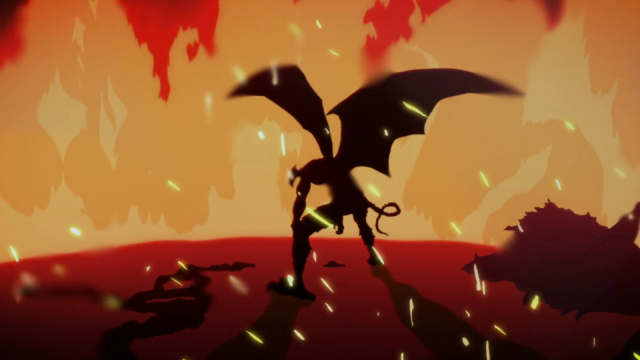
Comments
2 responses to “What We Loved About Devilman Crybaby”
Devilman is Violent Jack, Another form of his. Idk if this new Devilman is good.
Anybody who is interested in Yuasa’s work, I cannot recommend enough Kaiba. Aesthetically, it is an homage to the early Tezuka-age anime, when it was still heavily influenced by things like Disney and Betty Boop. Plot-wise, it’s an incredibly rich thought experiment on what much of ourselves our memories constitute to the point where one must wonder, if separated, self and memories, which one is the real you? And how much does your body, original or current influence how your memories interact with the world?
It is also has a non-conventional narrative style and order (that befits it) and some massive, but–in hindsight–heavily foreshadowed twists.
It is not perfect by any means, but it is ambitious and mind-bending and utterly beautiful.